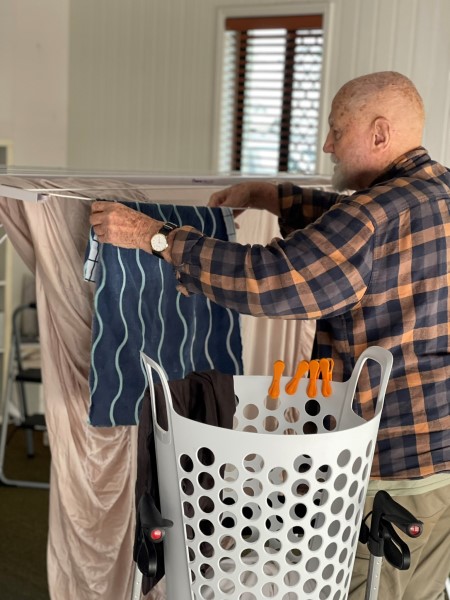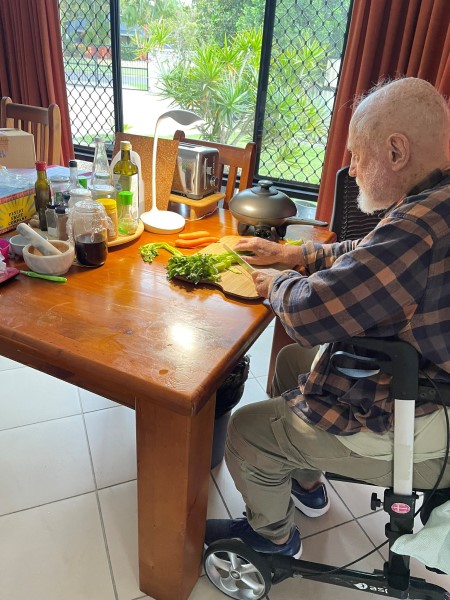A little bit of support can change your life

Vietnam War veteran Ken Robinson has found joy and satisfaction in the small things that fill his days.
The 91-year-old spends time each day working in the container garden in his backyard. ‘It’s a form of therapy. I like to see things grow,’ he says from his home in Woodgate on the coast of south-east Queensland, where he lives alone.
His gardening contributes to another passion – cooking. Vegetables such as bok choy, carrots and celery go straight from the garden to the chopping board in his kitchen.
Seated on his ‘wheelie walker’ – essential to his mobility in the house and garden – Ken spends his afternoons cooking Asian food. ‘There’s something special about adding a few things from your own garden into a stir fry,’ he says.
While Ken works, classical Chinese music fills the house. He is now deaf to a lot of sounds, but the classical music breaks through, masks his tinnitus and helps him relax.
‘Who would have thought a little box on a stick with strings attached could make such a difference?’ he says of the erhu, sometimes called the Chinese violin. ‘I can hear them as clear as a bell – instruments that were first heard in China more than a thousand years ago.’
It hasn’t always been like this for the former military policeman, who has been diagnosed with PTSD. ‘Like many veterans, I had given up,’ he says. ‘I could have easily become one of those statistics.’
‘I’ve been lucky to have my family’s help. My son and daughter have been there for me. They’ve helped me get through some dark times and find the space to be positive.’
Ken says that getting started involved some paperwork and phone calls, but he soon discovered there’s a lot of support available. Accessing the right services made a real difference to his ability to live well at home. 'Remember in the long run that the services are there to help you live well,' he adds.
Ken and his daughter worked with his GP to develop a personalised care plan, which includes physiotherapy, podiatry, optometry and dental support treatments as required, along with regular GP visits.

His broader care team also includes an occupational therapist who visits Ken regularly, working with him on his treatment plan and providing DVA-funded aids and equipment to make life easier.
‘The occupational therapist is magnificent,’ Ken says. ‘She got me all the toys I need to live out my life independently at home.
‘There are things I didn’t even know about. Small things, when combined can make a big difference,’ he says, pointing out the small wedges installed in doorways to overcome trip hazards, an indoor clothesline with special pegs so he can do his laundry without needing to go outside, and the shower head with flexible tubing that allows him to sit on a chair while showering.
A BlueCare nurse comes regularly to help Ken shower. He also gets home care support through DVA, with a carer visiting weekly to help with shopping, cleaning and meal preparation.
‘With a good team supporting me, including my family, I can live out my life at home perfectly well.’ This is important for Ken, who likes his personal space and values his privacy.
His message to other veterans who may have had similar experiences is: ‘There is help available out there. Reach out and ask.’
- For more details about DVA’s aged-care services, veterans and families can visit the DVA website or call 1800 VETERAN (1800 838 372). Useful aged-care guides are available at www.dva.gov.au/ac.
- For free, military-aware mental health support, Open Arms – Veterans & Families Counselling is available 24/7. Phone: 1800 011 046